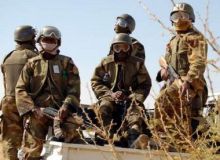African force in Darfur stymied by shortages, mission
By Emily Wax, The Washington Post
Nov 21, 2005 (SHEARIA, Sudan) — Under the blazing sun, a squad of African Union peacekeepers guarded a group of women as they gathered yams in a field outside the charred remains of this village in Sudan’s Darfur region, making sure they were not followed or assaulted by marauding gunmen.
 “It’s the least we can do. But we just pray nothing happens to us while we are doing it,” said Mustafa Aleu, 28, a Nigerian peacekeeper standing watch near the village, which was burned and bombed two months ago in renewed violence between African rebels and pro-government Arab militias.
“It’s the least we can do. But we just pray nothing happens to us while we are doing it,” said Mustafa Aleu, 28, a Nigerian peacekeeper standing watch near the village, which was burned and bombed two months ago in renewed violence between African rebels and pro-government Arab militias.
At outposts across Darfur, African Union forces have been coordinating patrols to protect women as they collect firewood or toil in the fields, where many have reported being harassed, beaten and even raped. But the peacekeepers themselves are also vulnerable to attack. Last month, two Nigerians were found dead after they reportedly ran out of ammunition during a firefight.
“Those men were like my brothers. They were good men,” said Aleu, adding that the entire mission, now at 7,000 troops, was shaken by the deaths. “My wife calls me every day now. She has terrible dreams. We just need so much more to do this job right.”
A little over a year ago, the first of the African Union troops were deployed in Darfur. The peacekeepers, from countries across the continent, were hailed as an African solution to African problems, with Darfur as the first major test.
At the time, the U.S. House of Representatives passed a resolution pushing the Bush administration to label the violence in Darfur “by its rightful name: a genocide.” The legislators also called for the use of African Union troops and promised to fund such a force to “stop the slaughter.”
Last month, however, a House committee voted to eliminate the $50 million that lawmakers had supported to fund the mission, including ammunition, fuel, helicopters and other supplies that African Union officers say are essential to monitoring the violence in a vast, mountainous desert.
On Friday, the Senate approved a bill called the Darfur Peace and Accountability Act encouraging the African Union to expand its force to 12,000 troops. Sens. Jon S. Corzine (D-N.J.) and Sam Brownback (R-Kan.) are also seeking to restore funding.
Even so, there is still widespread fear among the African Union forces that they will be forgotten as world leaders focus on a seventh round of Darfur peace talks in Nigeria and on high-level efforts by the U.S. government to unite a fractured anti-government rebel group.
“No Power to Protect,” a report released last week by the U.S.-based group Refugees International, details instances in which forces were understaffed and outgunned. The report says the African Union needed a stronger mandate allowing its forces to intervene against attacks on civilians.
The report says the mission also needs more helicopters, ground vehicles and communications equipment.
In the report, a Rwandan soldier says: “We couldn’t defend ourselves with the equipment we currently have. To well-armed forces like those of the government of Sudan, Janjaweed, SLA we represent little more than a nuisance.” Janjaweed is the name of the pro-government Arab militias. The Sudan Liberation Army is the main rebel movement in Darfur.
On the ground, the peacekeepers said they were still awaiting body armor and often heard about violence but did not have enough helicopters to investigate.
“It’s very, very dangerous not to have enough aerial reconnaissance in these wide-open fields where militia and rebels are roaming,” said Brian Johnstone, a British police liaison to the African Union. “You would not see any other forces like the U.N. or NATO left alone like this. It’s frustrating to hear of an attack hundreds of miles away and not do anything about it.”
The crisis erupted in February 2003 after rebels from African tribes took up arms against the government, saying Darfur was underdeveloped and lacked political power.
The government bombed villages to force the rebels out and allegedly unleashed the Arab militias that mounted a campaign of burning and pillaging villages, inflaming old rivalries over resources between Arab nomads and African farmers.
At least 200,000 people have died, according to the United Nations. The crisis has emptied villages across Darfur, leaving more than 2 million people in camps.
The United Nations and the U.S. government initially blamed the Janjaweed and the government for much of the bloodshed. But the situation has grown increasingly chaotic as various rebel factions have engaged in more recent violence, including kidnappings of peacekeepers and humanitarian workers and seizures of food convoys.
U.N. officials and humanitarian workers have suggested that a stronger peacekeeping organization, such as NATO, be brought in. Sudan’s government rejects that idea.
After a speech at the University of Khartoum, Deputy Secretary of State Robert B. Zoellick said that foreign forces were not an option and that the peace process would have to move forward through talks in Abjua, the Nigerian capital. “Frankly I don’t think foreign forces want to get in the middle of a tribal war of Sudanese,” Zoellick said.
Sudanese professors and opposition party leaders said they enjoyed the speech — except for Zoellick’s blunt declaration that “all sides in Sudan also have to be committed to peace.”
Some in the audience expressed doubt that all parties would ever be truly committed to peace. “When he said that, well, that just really frightened me,” said Ezekiel Kondgo, an Episcopal bishop who looked grim and laughed nervously.
(The Washington Post)
